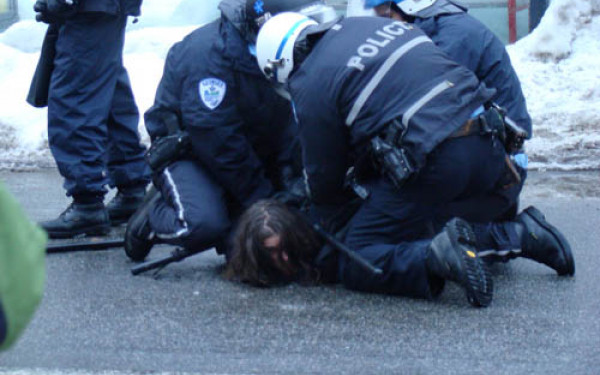Post-Flood Frustrations
Montrealers Returning Home Get Little Help From the City
Montreal residents displaced by this month’s floods are returning home to assess the damages and figure out what the next steps are—without much help from the city.
During the flooding, those affected could barely sleep or rest. After all, anyone can understand that a basement full of water is troublesome for the foundation of the entire house. The damaged basements are a big problem, but the city’s indifference is even bigger.
According to The Globe and Mail, in Quebec, over 2,700 houses were damaged in the floods that took place over the past weeks. Some evacuated residents came back last week to get a measure of the harm caused, and in some cases, the damage was extensive
Pierrefonds resident Itsik Romano didn’t know what he would find when he went back to his flooded home for the first time in days. Although his house was not in as bad a shape as he’d expected, Romano still had a lot of work to do: he had to clean up, recycle, throw things away and renovate, because the mold and sewage smell is everywhere in his house.
Romano, his wife Kim Bronstein and their four children are among those who fled their homes because of the flooding. They’re staying with friends for now, and it will take weeks or perhaps months to return to their place. Romano said that the three feet of water in his basement turned everything it touched into garbage: wood, toys, photographs, papers, his first animated film, taxes and bills, appliances, and more have been lost.
The worst part was saying goodbye forever to his favorite but damaged things. “Tears hit me when I saw all our children’s artwork, I can’t save anything,” he said. “All these diaper boxes contain years of creations.”
While they’ve had a significant amount of help from the local community, the same can’t be said about the city’s administration. “I’m overwhelmed with the support we are getting from friends and family and many others via social media. But to get none from our city? Shame,” Romano posted on his Facebook page.
The city seemed to be unprepared to do what was necessary during the crisis. Romano said that he didn’t get any help when it came to leaving his house with his wife and children. “I called 911 so I could get some help for my wife to walk out of the house in the water with our baby […] but they told me no one was available,” Romano said.
He also mentioned that the signs of a coming flood were obvious beforehand, and there was enough time to inform residents. But the city failed to handle this situation, he said. As of May 3, some streets in Pierrefonds-Roxboro were already covered by the water.
The flood on Romano’s street was caused by the sewage system that failed to drain water just before the flooding during the weekend of May 6. Heavy rain also added more water to the rivers. Romano said that this information, as well the weather forecast, was available to the officials—but the city did nothing. By May 7, when the water level became higher, only volunteers and local community members came to help.
After the water was gone, the complications were still there, and support from the city was still lacking. There were no instructions for people returning to their homes for the first time since the flood. There was no note informing residents that before entering the house an electrician and a firefighter should check their houses as a security measure, or that people should call 311, which is the city hotline, for any help. The people entering their houses after the flood didn’t know what they were going to do.
“They started to rebuild walls, some people on my street even replaced the electrical wires. It is very dangerous, because this is not permitted by Hydro-Québec,” Romano said. He believes the city should have distributed instructions for the steps to take when returning to houses affected by the flood.
Is the city or the province ill equipped to react promptly in emergency situations? The Canadian Environmental Assessment Agency is responsible for flood assessments for prevention, but Romano points out that the mayor is the face of the city, and in charge of handling the city’s issues. He said that the mayor of Pierrefonds-Roxboro, Dimitrios Jim Beis, is not coordinating a proper team. “I was feeling like being in an unknown zone,” he added.
Residents from the entire neighborhood were trying to reach officials from the city to begin filing their claims, without any success. Every day that Romano called the Quebec public security ministry currently tasked with receiving claims filed due to flood damage, they took his name and said that someone would contact him shortly, but nothing has happened since. With the intention of taking action against the city, Romano and his neighbors sent an official registered letter on May 17 to Pierrefonds-Roxboro’s city hall saying that they are responsible for all damages due to the flood.
Not enough steps were taken to help people. The Canadian forces were deployed in time to the most affected zones. Quebec’s provincial government has also announced a compensation plan. According to CBC News, the Red Cross started a fundraising to help disaster victims.
These measures are all a great help for the people in the flooded areas. However, raising awareness of preventive efforts to minimize, or even avoid the damage is much more important in such a dangerous situation.
The government should improve the effectiveness of its institutions, especially when a state of emergency is declared. It should train professionals, it should provide more funding to security, the sewage system, organized evacuation, after-flood support, and financial assistance.
People whose houses have been damaged by the floods should receive more assistance when returning to their potentially dangerous homes. This would further help protect our society, residents and their properties.






